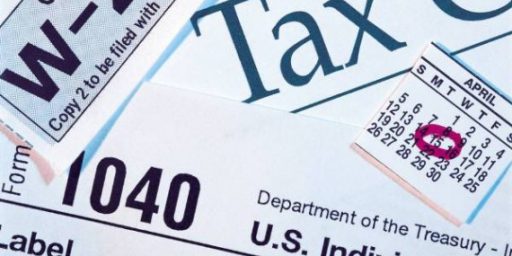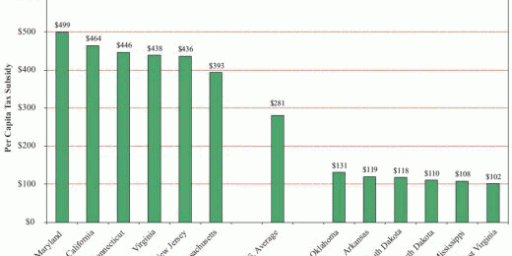A Flat Tax & Home Mortgage Deductions
Over at RealClearPolitics, J. McIntyre, makes the following claim,
On the other hand, a flat tax with ONE and only ONE deduction for your home would vastly improve the current federal income tax and with serious support from the President could get through Congress. I don’t know what allowing for a deduction for your home mortgage does to the numbers and what rate would be needed to make the plan revenue neutral. But not allowing the home ownership deduction would make the reform extremely vulnerable politically, and could be a fatal stumbling block towards getting any plan passed.
I don’t see what is so magical about the home mortgage deduction? Sure it is a big deduction, but why wouldn’t a flat tax with large deductions based on the size of the family work just as well? Further, a flat tax rate on all income with a generous personal allowance would address the issue of progressivity and not unduly burden the poor. It might also possible to incorporate some sort of negative income tax for those at the low end of the income distribution. However, gutting the current welfare system would have to occur for the latter provision to be included. This would also have the benefit of getting rid of those wasteful bureaucracies that produce nothing and are involved merely in the redistribution of wealth (mostly to the pockets of the government bureaucrats). Further, those bureaucrats would have to look for new jobs…jobs that are actually, you know…productive.






I think the argument for keeping the home mortgage deduction is simply that it’s just too popular to kill, given its widespread beneficiaries. Plus, given that many of us made the huge commitment to a home mortgage at least partially with the deduction in mind–a slightly too high mortgage payment become s affordable once the deduction is factored in–it would have to at least be grandfathered in.
Still, I don’t see why a large personal deduction couldn’t cover it. For example, the Hall-Rabushka flat tax proposal has a $25,500 deduction (that was 1995) for a family of 4. That is pretty big and should be larger than many people’s mortgage deduction.
Leaving in the mortgage deduction violates the notion of horizontal equity: treating people with the same income the same in terms of taxes. If Bob has a house and a $12,000 annual mortgage deduction and Joe (who has the same income as Bob) doesn’t, then Joe is taxed at a higher rate simply by not having a house.
Giving both Bob and Joe a $12,000 deduction solves the problem completely. Bob is no worse off, and Joe is treated the same as Bob.
It is the allowing of these kinds of “special treatments” that has FUBARred the current tax system. The idea of simplification is to get rid of them. If it can be done, and make most people better off or at least no worse off, where is the problem?
In addition to the important concern that it’s far too disruptive to eliminate a crucial – and substantial – deduction that millions have relied upon, there’s also a public policy argument to be made: Home ownership contributes so manifestly and universally, to social stability – a major function of government – that the deduction can be justified solely on the grounds that it furthers a vital government interest for free.
Plus, keeping it would really annoy the lefties, who like to call it a “subsidy for millionaires to buy mansions” and anything that annoys that set must be good policy.
No, the real fight isn’t going to be over what to do about the mortgage interest deduction. That’s sacrosanct. It will be over the charitable deduction. A *lot* of well-connected and motivated people who do nothing for a living but romote and/or lobby for all sorts of special interests and other beneficiaries of that deduction will fight tooth and nail not to have it eliminated, too. There are decent public policy arguments for it, too, of course, but it requires a lot more rules, regs, and ‘crats to keep, too.
I think the deductibility of state & local taxes is much more of a “third rail” than home mortgage interest deductibility. The last thing anyone on either side is going to propose is another Red-Blue war, which scrapping that deduction would entail.
I agree completely with Dodd; the home mortgage INTEREST deduction (you deduct the interest you pay on your mortgage, NOT the price of the mortgage itself) helps everyone who owns a home, which according to the latest statistics I’ve heard, is up to 69%.
It is taken as a given that someone who owns a home will have much more of a vested interest in the events that occur in that community, and this makes for a much more stable society.
As much as I would like to see the scrapping of the ridiculous tax system, to replace it with a graduated (three tiers) flat tax, it won’t happen unless they leave the mortgage interest deduction.
How much does the mortgage interst deduction distort prices in housing?
You have hinted at that with your statement “a slightly too high mortgage payment become s affordable once the deduction is factored in”
From the other side of that transaction it looks like this: Once the deduction is factored in prices can be raised to capture that money.
Not so?
Fred, that’s undoubtedly true, but I think it’s just a function of the market more than any deliberate choice.
Homesellers want to attract buyers, which would tend to depress the price for which they ultimately will sell, but if the asking price is too much higher than the market will bear, offers will be fewer and the home will take longer to sell.
The effect of the deduction, I think, insofar as it enters into anyone’s thinking, is that it makes buyers more willing to offer a higher price in order to get the home they want. I doubt it affects the seller’s decisionmaking much at all, directly — but as closing prices in the community are buoyed by the effect of the deduction, that effect will tend to lead sellers to set their asking prices higher than they might if it didn’t exist.
For all the people who are making the stable-society-good-thing-sancrosanct argument the same can be said for many activities. How about starting a small company? Why not give them special deductions. Having children. Etc. Basically, nobody is actually in favor of simplification, they are in favor of simplification for everybody else, just don’t touch my goodies.
What about home owners who have no children? It is expensive to raise kids, but why not base the deduction on money spent, not numbers of kids? Continuing to penalize smart people for choosing not to reproduce, and rewarding those for turning out litter after litter, and then not caring for them, is the root of many problems in our society.
As for the mortgage deduction, I’ll take anything I can get. Our tax rate is $28 per &1,000 in NH. In our town the assessments are high (perhaps higher than market value) because of the rise in real estate. It is not uncommon for people to pay $500 a month in taxes, and many pay over $1000 a month. The American dream is to own your own home, not rent it from the town.